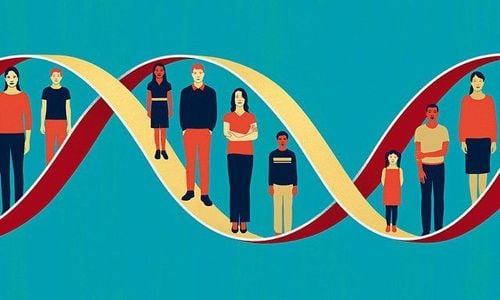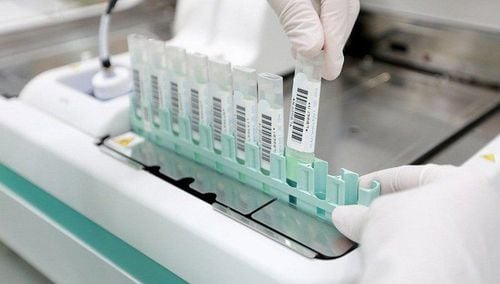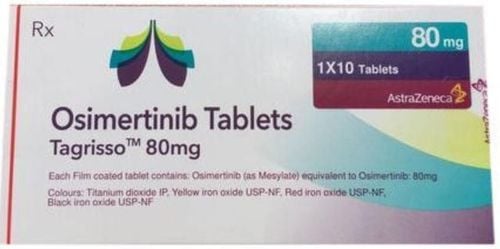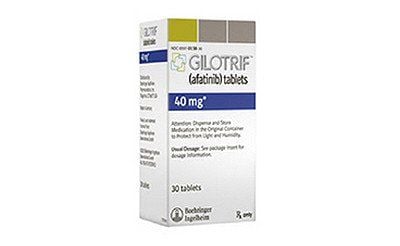This is an automatically translated article.
Biomarker testing or genetic testing is the golden key to lung cancer screening. Lung cancer biomarker testing is also known as tumor testing, gene mutation testing, and next generation sequencing (NGS). The article below helps you understand more about biomarker testing for lung cancer.
1. What is lung cancer screening?
Screening is the examination and detection of disease when there are no symptoms, the screening can help detect the disease at an early stage, thereby increasing the possibility of better treatment.
Early detection of lung cancer will help increase the rate of complete cure, increase survival time and reduce medical costs for patients.
2. What is genetic testing?
Gene testing is a method of analyzing DNA (Deoxyribonucleic Acid) to identify genetic factors and traits related to heredity. Many people are familiar with genetic testing that checks the blood relationship between two or more individuals. However, in medicine, this test helps to find genes that are at risk of causing disease and pass it on to the next generation for prevention and intervention.
This test also shows what genes a person is born with inherited from their parents. Whether the gene is good or bad, the genome structure of each person is unchanged, will follow them and determine the characteristics of the trait. So this test is necessary to help each of us better understand ourselves and make the right decisions regarding our own lives.
3. Biomarker test for lung cancer
Biomarker tests help look for changes in the DNA of tumor cells. These changes include mutations, additions, deletions or rearrangements in the DNA. "Specific biomarkers" in tumor cells can be used to determine the best course of treatment for lung cancer patients.
When a lung cancer patient first receives a lung cancer diagnosis, it is the best time to discuss biomarker testing. Biomarker testing is different from genetic testing used to find out if someone has a genetic mutation that makes them more likely to develop cancer.
4. How are biomarker tests used to select lung cancer treatments?
Biomarker testing can help your doctor choose a cancer treatment for you. Some cancer treatments, including targeted therapies that kill cancer cells and immunotherapy, may only work for people with cancers that have certain biomarkers.
For example, people with cancer that have certain genetic changes in the EGFR gene can have treatments that target those changes, called EGFR inhibitors. In this case, a biomarker test that looks to see if a cancer that changes the EGFR gene can be treated with an EGFR inhibitor.
Biomarker testing can also help you find research on new cancer treatments (clinical trials) you can participate in. Some studies enroll people based on biomarkers in their cancer, rather than where in the body the cancer started.
For some other clinical trials, a biomarker test is part of the study. For example, studies like NCI-MATCH and NCI-COG Pediatric MATCH are using biomarker tests to match people to treatments based on genetic changes in a person's cancer. sick.
If your doctor decides to make biomarker testing part of your care, they will take a sample of cancer cells. If you have a solid tumor, they may take samples during surgery. Without surgery, you may need a biopsy of the tumor.
For some biomarker tests that analyze genes, you will also need to provide a sample of your healthy cells. This is usually done by drawing blood, saliva, or a small piece of skin. These tests compare cancer cells with healthy cells to look for genetic changes (called somatic mutations). Somatic mutations cause most cancers and cannot be passed on to family members.
In addition to specialized medical services. Lung cancer screening is the most effective measure for you to detect and promptly treat lung cancer, protect your health and life. Currently, Vinmec International General Hospital has a lung cancer screening service with many outstanding advantages such as: A team of highly qualified and experienced doctors; Having a full range of specialized facilities for diagnosis and staging before treatment: Endoscopy, CT scan, PET-CT scan, MRI, histopathological diagnosis, genetic - cytological testing... Having a full range of mainstream cancer treatment methods: surgery, radiation therapy, chemotherapy, stem cell transplant.... will help customers screen the disease effectively and have timely treatment if detected. present illness.
Please dial HOTLINE for more information or register for an appointment HERE. Download MyVinmec app to make appointments faster and to manage your bookings easily.













